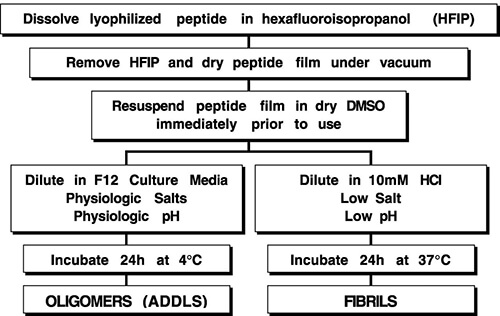How to form the fibrillary structure using beta-amyloid peptides?

Amyloid (1-42) was dissolved to 1 mM in 100% hexafluoroisopropanol, hexafluoroisopropanol was removed under vacuum, and the peptide was stored at -20 C. For the aggregation protocols, the peptide was first resuspended in dry Me2SO (DMSO) to 5 mM. For oligomeric conditions, F-12 (without phenol red) culture media was added to bring the peptide to a final concentration of 100 uM, and the peptide was incubated at 4 C for 24 h. For fibrillar conditions, 10 mM HCl was added to bring the peptide to a final concentration of 100 uM, and the peptide was incubated for 24 h at 37 C. ADDLS, amyloid-derived diffusible ligands. Reference: Oligomeric and Fibrillar Species of Amyloid-Peptides Differentially Affect Neuronal Viability; https://www.jbc.org/article/S0021-9258(20)70063-3/pdf
Peptide science is expanding rapidly due to the potential applications of these biocompatible and bioactive molecules. However, their use in medicine is limited by several factors, with low solubility being a significant hurdle in early drug development. Solubility is crucial but not well understood, and no universal method exists for peptide solubilization. This review examines the challenges in dissolving peptides and the factors influencing their aggregation and evaluates various solubilization strategies. Here are some practical tips for handling difficult sequences, with a focus on challenging amyloids like amyloid beta (Aβ), insulin, and phenol-soluble modulins (PSMs). Download the reference Here.
Reference:
R. Oyola, D. Du, I. Ramos, K. Torres, A. S. Delgado, E. R. Serrano, A. Meléndez and N. V. Falcón-Cruz, Mater. Adv., 2021, DOI:10.1039/D1MA00461A.
Polanska O, Szulc N, Stottko R, Olek M, Nadwodna J, Gasior-Giogowska M, Szefczyk M. Challenges in Peptide Solubilization - Amyloids Case Study. Chem Rec. 2024 Jul 18:e202400053. doi: 10.1002/tcr.202400053. Epub ahead of print. PMID: 39023378.
... AB40 was obtained from Life Tein Company (NJ, USA). A certified analysis of the peptide established that the purity is higher than> 95% with a formula weight of 4329.9 …
| Beta-Amyloid (1-42), human |
| 0.5 mg, 1 mg, 5 mg, >95% Purity |
| Beta amyloid 1-42 is known as a biomarker of Alzheimer's disease. Amyloid is detectable in cerebrospinal fluid (CSF). It is a 42-amino acid fragment of amyloid precursor protein. The peptide is well suited for use as a standard in the quantitation of Alzheimer's. Amyloid (1-42), a major component of amyloid plaques, accumulates in neurons of Alzheimer’s disease brains. Biochemical analysis of the amyloid peptides isolated from Alzheimer's disease brain indicates that Amyloid(1-42) is the principal species associated with senile plaque amyloids, while Aß (1-40) is more abundant in cerebrovascular amyloid deposits. |
| LT2460 |
| 4514.14 |
| C203H311N55O60S1 |
| Asp-Ala-Glu-Phe-Arg-His-Asp-Ser-Gly-Tyr-Glu-Val-His-His-Gln-Lys-Leu-Val-Phe-Phe-Ala-Glu-Asp-Val-Gly-Ser-Asn-Lys-Gly-Ala-Ile-Ile-Gly-Leu-Met-Val-Gly-Gly-Val-Val-Ile-Ala, DAEFRHDSGYEVHHQKLVFFAEDVGSNKGAIIGLMVGGVVIA |
